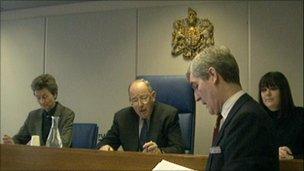Top judge Lord Justice Goldring wants to save 34 courts
- Published

There are almost 29,000 magistrates in England and Wales
The senior presiding judge for England and Wales has said he cannot back the closure of 18 of the 103 magistrates' courts earmarked for closure.
Lord Justice Goldring also named 16 county courts that should be saved, in response to the Ministry of Justice's consultation on court services.
But, he did say there was a clear case for closing 32 other magistrates' courts and 14 county courts.
Magistrates handle committal hearings, lesser crimes and some civil matters.
In June, the government announced plans to consult on the closure of 103 of the 300 magistrates' courts in England and Wales, and 54 county courts.
It is understood that closing the courts would save the government at least £15m a year in running costs, plus an extra £22m in maintaining the buildings.
21st Century courts
The Lord Chancellor asked Lord Justice Goldring to consider the proposals, taking into account the views of local judges and magistrates.
In his 89-page response, Lord Justice Goldring, external listed courts he agreed should be closed but also those he thought should remain open.
He said more detail was needed before a decision could be reached over the fate of the rest of the 53 magistrates' and 24 county courts.
The courts he wanted to save included: Newbury magistrates' and county, in Berkshire; Harlow magistrates' and county, Essex; Northwich magistrates' and county, Cheshire; Bishop Auckland magistrates' and county, Durham; Skipton magistrates' and county, North Yorkshire; Tamworth magistrates' and county, Staffordshire; Aberdare magistrates' and county, Rhondda Cynon Taf and Llangefni magistrates' and county in Anglesey.
The other magistrates' courts he thought should stay were: Tynedale, in Northumberland; Frome, Somerset; Stroud, Gloucestershire; Spalding, Lincolnshire; Salford, Greater Manchester; Woking, Surrey; Waltham Forest, London; Abergavenny, Monmouthshire; Cardigan, Ceredigion and Pwllheli, Gwynedd.
And the other county courts were Runcorn, in Cheshire; Trowbridge, Wiltshire; Barnsley, South Yorkshire; Epsom, Surrey; Ilford, London; Mayor's and City of London; Burton, Staffordshire and Shrewsbury, Shropshire.
Lord Justice Goldring said: "I have sought to identify where closure will result in genuine difficulties for court users whilst at the same time taking a pragmatic view, based on the available information, about the level of court provision which is required in the 21st Century."
As the senior presiding judge for England and Wales, Lord Justice Goldring oversees the work of all magistrates and judges in England and Wales.
The courts earmarked for closure by the government make up 30% of the 540 in England and Wales.
There are almost 29,000 magistrates in England and Wales - volunteers drawn from the local community - and they deal with nine out of 10 cases that come before the courts.
District judges also appear at magistrates' courts to deal with more complex cases that do not need to be sent to full trial at crown court.
County courts deal with most cases brought under civil law, including divorces and family disputes, business cases, housing issues, accident claims and small claims.
- Published23 June 2010